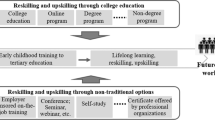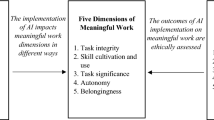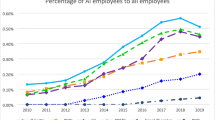Abstract
While it is said that merchant ships are now so automated and sufficiently reliable for little skill to be demanded of those who control them, on the other hand, it is also argued that today’s merchant ships are so complicated that only those who fully comprehend their complexities should be entrusted with their operation. This paper attempts to obtain more insight into this paradox and systematically examines the technological imperative in shipping and its accompanying challenges particularly the skilling dilemma. It then delves into the contrasting theories of technological change implications in the work environment before arriving at the plausible correct understanding that appears to provide the viable explanations and solution.

Similar content being viewed by others
References
Allen P (2009) Perceptions of technology at sea amongst British seafaring officers. Ergonomics. doi:10.1080/00140130902971924
Anand N (2011) New technologies, work, skills and identity—the case of maritime industry. Cardiff University, Cardiff
Billbsberry J (1996) There is nothing so practical as a good theory: how can theory help managers become more effective. The effective manager: perspectives and illustrations. Sage, London
Braverman H (1974) Labor and monopoly capital: the degradation of work in the twentieth century. Monthly Review, New York
Charsley W (1989) The human factor in automation. Inf Manag Int 2:21
Collins P, Hogg J (2004) The ultimate distributed workforce: the use of ICT for seafarers. AI Soc. doi:10.1007/s00 146-003-0287-5
Flottau J (2011) Regaining control. Aviat Week Space Technol 173:87–88
Hadnett E (2008) A bridge too far? J Navig. doi:10.1017/S0373463307004675
IMO (2012) International maritime organization: summary of the meeting of the Sub-Committee on Safety of Navigation, 58th session.
King J (2001) Technology and the course of Shipping. Ocean Coast Manag 44:567–577
Lützhöft M, Dekker S (2002) On your watch: automation on the bridge. J Navig 55:83–96
Macrae C (2009) Human factors at sea: common patterns of error in groundings and collisions. Marit Policy Manag. doi:10.1080/03088830802652262
Orlikowski W (1992) The duality of technology: rethinking the concept of technology in organizations. Organ Sci 3:398–427
Osterman C, Rose L, Osvalder A (2010) Exploring maritime ergonomics from a bottom line perspective. WMU J Marit Aff 9:153–168
Osterman C (2012) Developing a value preposition of maritime ergonomics. Department of Shipping and Maritime Technology, Chalmers University of Technology.
Perrow C (1983) The organizational context of human factors engineering. Adm Sci Q 28:521–541
Rasmussen J (1983) Skills, rules and knowledge: signals, signs and symbols and other distinctions in human performance. IEEE Trans Syst Man Cybern 13:257–266
Sauer J, Wastell D, Hockey R, Crawshaw C, Ishak M, Dowing J (2002) Effects of display design on performance in a simulated ship navigation environment. Ergonomics. doi:10.1080/00140130110116128
Schroder-Hinrichs J (2010) Human and organizational factors in the maritime world—are we keeping up to speed? WMU J Marit Aff 9:1–3
Tang L, Sampson H (2011) Training and technology: findings from the questionnaire study. Seafarers International Research Centre Symposium Proceedings, Cardiff
Taylor F (1947) Scientific management. Harper and Brothers, New York
Author information
Authors and Affiliations
Corresponding author
Rights and permissions
About this article
Cite this article
Bhardwaj, S. Technology, and the up-skilling or deskilling conundrum. WMU J Marit Affairs 12, 245–253 (2013). https://doi.org/10.1007/s13437-013-0045-6
Received:
Accepted:
Published:
Issue Date:
DOI: https://doi.org/10.1007/s13437-013-0045-6




